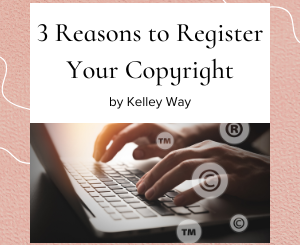The Perils of Internet Posting
Welcome to the semi-regular series on artist entrepreneurship. Today we focus on writers specifically and on an important issue to be aware of in today’s electronic world — what you can or cannot post online and still be considered unpublished — from our monthly guest columnist, Kelley Way, a lawyer specializing in literary law. If you have general questions for Kelley on contracts or other aspects of literary law, be sure to comment below. Thanks!
PS. A list of books on literary law can be found here.
And now for a bit of necessary legalese: Please note that this article does not constitute legal advice, and that an attorney-client relationship is not formed by reading the article or by commenting thereon.
^*^
I came across an interesting warning while browsing a writer’s forum: it told writers to be wary when posting their works at the forum, because some publishers considered that a publication and would pay much less for it than they would have if the work was “unpublished.” My curiosity raised, I did some digging to see whether this was really true.
According to the Copyright Act, a “publication” is defined as “the distribution of copies…of a work to the public by sale or other transfer of ownership, or by rental, lease, or lending. The offering to distribute copies…to a group of persons for purposes of further distribution…constitutes publication.”
In English, that means a work is published when it’s given out to the general public, or given to someone else to give to the general public for you.
This didn’t quite answer the question, so I looked around for some cases. I learned from these that a limited or necessary distribution was not a publication, and that typically courts found publication when the work was sold for money.
Unfortunately, I couldn’t find any case that asked (or answered) whether posting a work online counted as a publication, which means that the courts haven’t decided this question yet.
So what should you do in the meantime? One option, if you haven’t posted your work already, is not to post it at all. That’s probably the safest route, but there are advantages to posting online that may outweigh the risks, such as building a fanbase and getting community feedback.
If you’re trying to build a fanbase, a good compromise may be to only post a part of your work online, so readers have an idea of what it’s about but there are still parts that haven’t been made available to them. If you’re trying to get feedback on your work, post it on a forum where registration is required to view it, or access to it is otherwise limited.
As I said earlier, limited distribution is not a publication, so there shouldn’t be a problem if your work is not available to the general public. An additional precaution would be to give a disclaimer in your post. Disclaimers are popular in the legal world – like the one here telling you this article does not constitute legal advice.
If you were to write in the post something to the effect of “This draft is being posted solely for the purpose of critique and feedback, to be used in later editing; this should not be considered a publication of a final work,” in addition to giving others limited access to it, your bases would be pretty well covered.
If you’re already in the situation where your work is posted online and a publisher insists it’s therefore been published, you can see if you can change his or her mind. Since the courts haven’t decided this point, you could make a good argument for why the online post does not count as a publication, particularly if you have edited the work since it was posted.
That’s all part of the negotiation process. It may not get you far if the publisher wants to be hardnosed about it, but it can’t hurt to try.
If that doesn’t work, you may be better off looking for another publisher that’s willing to pay fair value for your work, or alternatively, publish the work yourself. And of course, you can always take the issue to the nearest courthouse. This will continue to be a gray area until someone does, so why shouldn’t that someone be you? 🙂
^*^
Kelley Way was born and raised in Walnut Creek, California. She graduated from UC Davis with a B.A. in English, followed by a Juris Doctorate. Kelley is a member of the California Bar, and an aspiring writer of young adult fantasy novels. She can be contacted at KelleyAWay@gmail.com.








An interesting post. I have posted ch 1 of my novel Lethal Inheritance on line, I’m going to add the disclaimer now, so thanks for the idea. Though I don’t think a partial publication would be a problem, as the saying goes, it’s better to be safe than sorry.
Agreed. Thanks for posting!
I love this post Beth, great information here. I am always leery about posting my working a public environment but mostly from someone stealing my work. I never thought that it would be considered published work!
Thanks always for the great advice and tips.
I was told that a name cannot be copyrighted. If I wanted to use the name Mickey Mouse in my book I could. I was told the name Maurice Chevalier, Sherlock Holmes, PeterPan, etc. could be used and no one can do anything about it. To use that name as a character in your book and it not be the same character as the name formerly used, is the question. Can I use the name Maurice Chevalier as a character in my book and it be my own character, and not the famous actor. Just like people name their children Maurice Chevalier (which by the way was my uncle’s name), is it okay to name a character a familiar name? I want to make sure the advice given me is absolute.
You’re right, a name can’t be copyrighted, but the name of a product or character can be trademarked. With trademarks, you can use the name as long as it’s referring to the character or product in question (I talked about this in my “What is Trademark” article). If you want to use a character’s name as the name for a character in your story, you’ll have to tread carefully. If it’s a very distinctive and well-known name, like Mickey Mouse, then people will think that the character has something to do with Disney’s Mickey Mouse, or that you had permission from Disney to use it. It’s possible that Disney might take exception to an author using the name of one of its biggest characters for a character in her story, and Disney likes to sue people. I wouldn’t recommend naming your characters after characters from other people’s stories, unless it’s used as a joke (for example, a little girl names her pet mouse Mickey).
As far as using the names of real people, there’s a bit more leeway there. As you said, people will name their children after celebrities, so as long as it’s clear that the character is not a stand-in for that celebrity, you should be all right. Thanks for posting!
A topic like this one is always hovering in the background of a writer’s mind, usually where we can’t deal with it directly (such as with my delight at finding this page when suddenly three people in my writing group have had “experiences” with other sites or people borrowing their work without crediting them)… so as you can guess, I was a bit delighted and distressed to find yet another page online, directing me, as if on purpose, to go research copyright and publishing law in general.
Thank you, Beth and Kelley, for providing a gentle “extra nudge”.
Eden, You’re welcome! I’m glad Kelley is with us to help us navigate the perils of internet posting.
Thanks for posting! I’m glad I was able to help.